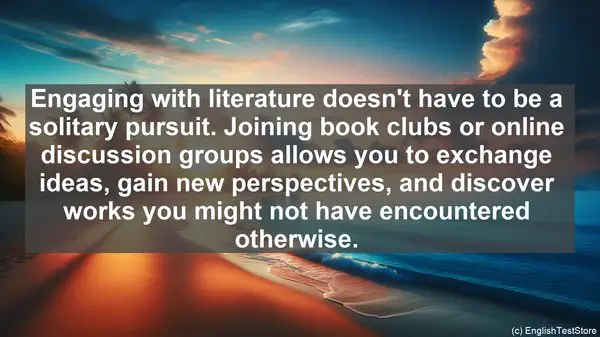Introduction: The World of English Literature
Hello, students! English literature is a vast and captivating realm, filled with timeless stories and profound insights. However, navigating this world can sometimes be challenging. In this video, I’ll be sharing my top 10 tips to help you engage with English literature more effectively. Let’s get started!
1. Active Reading: Beyond the Surface
Reading actively involves more than just scanning words. It’s about immersing yourself in the text, questioning, and making connections. Underline or highlight key passages, jot down your thoughts, and ask yourself why the author made certain choices. This approach deepens your understanding and makes the reading experience richer.
2. Contextual Understanding: The Bigger Picture
To truly grasp a literary work, consider its historical, social, and cultural context. Understanding the time period, the author’s background, and prevalent ideologies adds layers of meaning. It’s like viewing a painting with knowledge of the artist’s life and the era it was created in.

3. Exploring Different Interpretations: A Kaleidoscope of Meanings
Literature is often open to multiple interpretations. Don’t limit yourself to the ‘right’ answer. Engage in discussions, read diverse analyses, and form your own perspective. The beauty of literature lies in its ability to evoke varied emotions and thoughts in different readers.
4. Analysis: Digging Deeper
Beyond the plot, analyze the characters, their motivations, and the underlying themes. Look for symbols, metaphors, and literary devices that enhance the narrative. This analytical approach unveils the intricacies of the text and the author’s intentions.
5. Building Vocabulary: A Treasure Trove of Words
English literature is a goldmine of vocabulary. Make it a habit to note down unfamiliar words and their meanings. Regularly expanding your vocabulary not only aids comprehension but also enhances your own writing skills.

6. Research: Uncovering Gems
When studying a literary work, delve into related research. Explore the author’s other works, read critical essays, and examine historical documents. These additional sources provide valuable insights and enrich your understanding.
7. Writing Practice: Expressing Your Thoughts
Writing about literature is an essential skill. Regularly practice composing essays or even journal entries about the texts you read. This not only helps you articulate your ideas but also strengthens your ability to construct coherent arguments.
8. Joining Book Clubs or Discussion Groups: Collaborative Learning
Engaging with literature doesn’t have to be a solitary pursuit. Joining book clubs or online discussion groups allows you to exchange ideas, gain new perspectives, and discover works you might not have encountered otherwise.
9. Attending Literary Events: Immerse Yourself
When possible, attend literary events like author readings, book fairs, or literary festivals. These immersive experiences not only expose you to new works but also provide opportunities to interact with authors and fellow literature enthusiasts.
10. Enjoyment: The Ultimate Goal
Above all, remember that literature is meant to be enjoyed. While analysis and study are important, don’t forget to simply revel in the beauty of a well-crafted sentence or the emotions a story evokes. Ultimately, it’s the joy of reading that makes the journey worthwhile.

